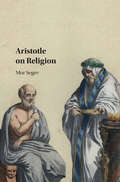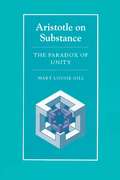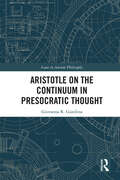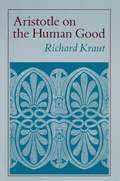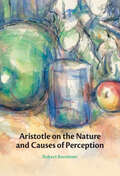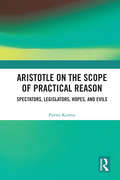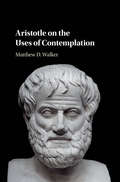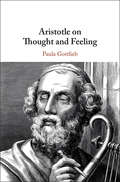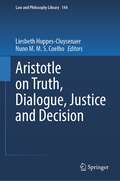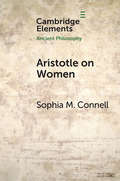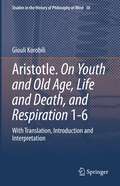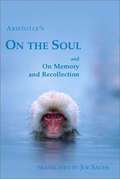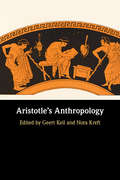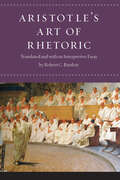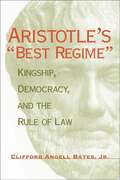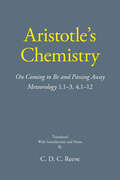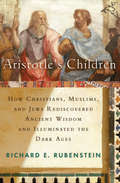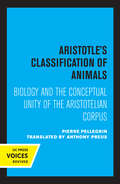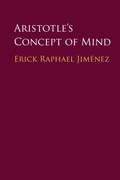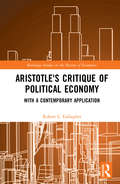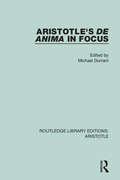- Table View
- List View
Aristotle on Religion
by Mor SegevAristotle is a severe critic of traditional religion, believing it to be false, yet he also holds that traditional religion and its institutions are necessary if any city, including the ideal city he describes in the Politics, is to exist and flourish. This book provides, for the first time, a coherent account of the socio-political role which Aristotle attributes to traditional religion despite his rejection of its content. Mor Segev argues that Aristotle thinks traditional religion is politically necessary because it prepares the ground for what he considers the pinnacle of human endeavor: attaining the knowledge of first philosophy, whose objects are real beings worthy of being called gods. Developing this interpretation, Segev goes on to analyze Aristotle's references to the myths of traditional Greek religion, and to assess his influence on medieval Jewish and Christian theology and philosophy of religion.
Aristotle on Substance: The Paradox of Unity
by Mary Louise GillThis book explores a fundamental tension in Aristotle's metaphysics: how can an entity such as a living organisma composite generated through the imposition of form on preexisting matterhave the conceptual unity that Aristotle demands of primary substances? Mary Louise Gill bases her treatment of the problem of unity, and of Aristotle's solution, on a fresh interpretation of the relation between matter and form. Challenging the traditional understanding of Aristotelian matter, she argues that material substances are subverted by matter and maintained by form that controls the matter to serve a positive end. The unity of material substances thus involves a dynamic relation between resistant materials and directive ends. Aristotle on Substance offers both a general account of matter, form, and substantial unity and a specific assessment of particular Aristotelian arguments. At every point, Gill engages Aristotle on his own philosophical ground through the detailed analysis of central, and often controversial, texts from the Metaphysics, Physics, On Generation and Corruption, De Anima, De Caelo, and the biological works. The result is a coherent, firmly grounded rethinking of Aristotle's central metaphysical concepts and of his struggle toward a fully consistent theory of material substances.
Aristotle on the Continuum in Presocratic Thought (Issues in Ancient Philosophy)
by Giovanna R. GiardinaThis book offers the first comprehensive analysis of the origin and development of the concept of physical continuity in ancient thought before Aristotle, combining a thorough study of Presocratic philosophy with Aristotle’s perspective.The concept of continuity plays a fundamental role in Aristotle's philosophy, particularly in his physics; however, nowhere in his corpus does he present his theory of continuity. In this book, readers gain a solid foundation for understanding Aristotle’s theory of the continuum through an in-depth exploration of Presocratic views on being and continuity. The book’s innovative approach critically analyzes Aristotle’s engagement with his predecessors, including the work of Anaximander, the Pythagoreans, Eleatic philosophy, and the Atomists. By addressing this gap in existing literature, this volume not only enriches the discourse on Presocratic thought, but also establishes a clearer understanding of Aristotle’s contributions to the concept of continuity.This book is suitable for students and scholars of ancient philosophy and the philosophy of science, particularly those working on Presocratic philosophy and Aristotle’s thought more broadly.
Aristotle on the Human Good
by Richard KrautAristotle's Nicomachean Ethics, which equates the ultimate end of human life with happiness (eudaimonia), is thought by many readers to argue that this highest goal consists in the largest possible aggregate of intrinsic goods. Richard Kraut proposes instead that Aristotle identifies happiness with only one type of good: excellent activity of the rational soul. In defense of this reading, Kraut discusses Aristotle's attempt to organize all human goods into a single structure, so that each subordinate end is desirable for the sake of some higher goal. This book also emphasizes the philosopher's hierarchy of natural kinds, in which every type of creature achieves its good by imitating divine life. As Kraut argues, Aristotle's belief that thinking is the sole activity of the gods leads him to an intellectualist conception of the ethical virtues. Aristotle values these traits because, by subordinating emotion to reason, they enhance our ability to lead a life devoted to philosophy or politics.
Aristotle on the Nature and Causes of Perception
by Robert RoreitnerIn this book Robert Roreitner offers a fresh interpretation of Aristotle's philosophically intriguing answers to what the nature of perception is, how it can be explained, and how perception is distinguished from mere appearance. He argues that for Aristotle, perception is a complete passive activity, and explains why this notion merely appears self-contradictory to us. He shows how Aristotle succeeds in integrating causal, qualitative, and relational aspects of perception, and explains why he is neither a 'spiritualist' nor a 'materialist'. He presses and resolves an unappreciated dilemma for Aristotle's hylomorphic account of perception and the role of the soul therein. This rich study shows that although Aristotle's understanding of perception may be in many respects outmoded, its core insights remain philosophically engaging. This title is also available as Open Access on Cambridge Core.
Aristotle on the Nature of Community
by Adriel M. TrottThis reading of Aristotle's Politics builds on the insight that the history of political philosophy is a series of configurations of nature and reason. Aristotle's conceptualization of nature is unique because it is not opposed to or subordinated to reason. Adriel M. Trott uses Aristotle's definition of nature as an internal source of movement to argue that he viewed community as something that arises from the activity that forms it rather than being a form imposed on individuals. Using these definitions, Trott develops readings of Aristotle's four arguments for the naturalness of the polis, interprets deliberation and the constitution in Politics as the form and final causes of the polis, and reconsiders Aristotle's treatment of slaves and women. Trott then argues that Aristotle is relevant for contemporary efforts to improve and encourage genuine democratic practices.
Aristotle on the Scope of Practical Reason: Spectators, Legislators, Hopes, and Evils
by Pavlos KontosThis book offers a new account of Aristotle’s practical philosophy. Pavlos Kontos argues that Aristotle does not restrict practical reason to its action-guiding and motivational role; rather, practical reason remains practical in the full sense of the term even when its exercise does not immediately concern the guidance of our present actions. To elucidate why this wider scope of practical reason is important, Kontos brings into the foreground five protagonists that have long been overlooked: (a) spectators or judges who make non-motivational judgments about practical matters that do not interact with their present deliberations and actions; (b) legislators who exercise practical reason to establish constitutions and laws; (c) hopes as an active engagement with moral luck and its impact on our individual lives; (d) prayers as legislators’ way to deal with the moral luck hovering around the birth of constitutions and the prospect of a utopia; and (e) people who are outsiders or marginal cases of the responsibility community because they are totally deprived of practical reason. Building on a wide range of interpretations of Aristotle’s practical philosophy (from the ancient commentators to contemporary analytic and continental philosophers), Kontos offers new insights about Aristotle’s philosophical contribution to the current debates about radical evil, moral luck, hope, utopia, internalism and externalism, and the philosophy of law. Aristotle on the Scope of Practical Reason will appeal to researchers and advanced students interested in Aristotle’s ethics, ancient philosophy, and the history of practical philosophy.
Aristotle on the Uses of Contemplation
by Matthew D. WalkerTraditionally, Aristotle is held to believe that philosophical contemplation is valuable for its own sake, but ultimately useless. <P>In this volume, Matthew D. Walker offers a fresh, systematic account of Aristotle's views on contemplation's place in the human good. The book situates Aristotle's views against the background of his wider philosophy, and examines the complete range of available textual evidence (including neglected passages from Aristotle's Protrepticus). On this basis, Walker argues that contemplation also benefits humans as perishable living organisms by actively guiding human life activity, including human self-maintenance. Aristotle's views on contemplation's place in the human good thus cohere with his broader thinking about how living organisms live well. <P>A novel exploration of Aristotle's views on theory and practice, this volume will interest scholars and students of both ancient Greek ethics and natural philosophy. It will also appeal to those working in other disciplines including classics, ethics, and political theory.<P> Links Aristotle's views on the ethical benefits of contemplation with his wider scientific philosophy about living organisms.<P> Takes account of recent developments and textual discoveries in Aristotelian studies, providing an up-to-date perspective on key issues.<P> Presents fresh interpretations of Aristotle's theoretical and practical corpus, making this book important for those working on ethics, political theory, classics and religious studies.
Aristotle on Thought and Feeling
by Paula GottliebAristotle's discussion of the motivation of the good person is both complicated and cryptic. Depending on which passages are emphasized, he may seem to be presenting a Kantian style view according to which the good person is and ought to be motivated primarily by reason, or a Humean style view according to which desires and feelings are or ought to be in charge. In this book, Paula Gottlieb argues that Aristotle sees the thought, desires and feelings of the good person as interdependent in a way that is sui generis, and she explains how Aristotle's concept of choice (prohairesis) is an innovative and pivotal element in his account. Gottlieb's interpretation casts light on Aristotle's account of moral education, on the psychology of good, bad and half-bad (akratic) people, and on the aesthetic and even musical side to being a good person.
Aristotle on Time
by Tony RoarkAristotle's definition of time as 'a number of motion with respect to the before and after' has been branded as patently circular by commentators ranging from Simplicius to W. D. Ross. In this book Tony Roark presents an interpretation of the definition that renders it not only non-circular, but also worthy of serious philosophical scrutiny. He shows how Aristotle developed an account of the nature of time that is inspired by Plato while also thoroughly bound up with Aristotle's sophisticated analyses of motion and perception. When Aristotle's view is properly understood, Roark argues, it is immune to devastating objections against the possibility of temporal passage articulated by McTaggart and other 20th century philosophers. Roark's novel and fascinating interpretation of Aristotle's temporal theory will appeal to those interested in Aristotle, ancient philosophy and the philosophy of time.
Aristotle on Truth, Dialogue, Justice and Decision (Law and Philosophy Library #144)
by Liesbeth Huppes-Cluysenaer Nuno M. M. S. CoelhoIn this thought-provoking book, you’ll find timeless questions explored through a fresh lens. First delving into the profound significance of Socrates’ dialogical method and the inescapable nature of conflict, it ponders the rational capacities of humanity in terms of establishing harmonious communities. But this isn’t merely a philosophical debate; it’s a pragmatic exploration of real-world challenges.No longer limiting itself to abstract theories, the book then seeks to navigate the practical terrain of science and politics. Drawing inspiration from Aristotle, renowned for his investigations into the intricate connections between theory, technology, ethics, and politics, it tackles the essential question: How can we reconcile divergent views?At the book’s core lies Aristotle’s revolutionary concept of dialogue, which portrays truth as a delicate equilibrium between opposing forces, transcending the rigid boundaries of true and false. Join this captivating journey as the author reveals the hidden paths to meaningful coexistence in a world filled with conflicting perspectives.
Aristotle on Women: Physiology, Psychology, and Politics (Elements in Ancient Philosophy)
by Sophia M. ConnellThis Element provides an account of Aristotle on women which combines what is found in his scientific biology with his practical philosophy. Scholars have often debated how these two fields are related. The current study shows that according to Aristotelian biology, women are set up for intelligence and tend to be milder-tempered than men. Thus, women are not curtailed either intellectually or morally by their biology. The biological basis for the rule of men over women is women's lack of spiritedness. Aristotle's Politics must be read with its audience in mind; there is a need to convince men of the importance of avoiding insurrection both in the city and the household. While their spiritedness gives men the upper hand, they are encouraged to listen to the views of free women in order to achieve the best life for all.
Aristotle. On Youth and Old Age, Life and Death, and Respiration 1-6: With Translation, Introduction and Interpretation (Studies in the History of Philosophy of Mind #30)
by Giouli KorobiliThis book is devoted to the last part of Aristotle’s collection of short treatises known today as the Parva Naturalia, i.e. the treatise On Youth and Old Age, on Life and Death, on Respiration. In the three main sections of the book, the author offers a translation, a commentary and a thorough analysis of this work. The author argues in favour of the unity of the work and contextualises its ideas within Aristotle’s corpus and the medical tradition of his time. After an Introduction to the nature of the work and its significance for the history of natural philosophy and science, a new English translation follows, along with a detailed commentary of Chapters 1-6, which combines philosophical discussion with philological observations. The book includes four interpretive essays, which tackle problems related to the whole treatise on a more philosophical basis, including questions about the structure and unity of the work, the organisation of the material, Aristotle’s methodological principles, his aims and target audience as well as the relevance of his selected themes to the thematic agenda of some Hippocratic writings. This book is of interest to students and researchers in Aristotle’s psychophysiology, and his views about the embodied mind, as well as to anyone concerned with the history of natural philosophy and science more generally.
Aristotle, Plato and Pythagoreanism in the First Century BC
by Malcolm SchofieldThis book presents an up-to-date overview of the main new directions taken by ancient philosophy in the first century BC, a period in which the dominance exercised in the Hellenistic age by Stoicism, Epicureanism and Academic Scepticism gave way to a more diverse and experimental philosophical scene. Its development has been much less well understood, but here a strong international team of leading scholars of the subject reconstruct key features of the changed environment. They examine afresh the evidence for some of the central Greek thinkers of the period, as well as illuminating Cicero's engagement with Plato both as translator and in his own philosophising. The intensity of renewed study of Aristotle's Categories and Plato's Timaeus is an especially striking outcome of their discussions. The volume will be indispensable for scholars and students interested in the history of Platonism and Aristotelianism.
Aristotle's: On the Soul and On Memory and Recollection
by Joe Sachs AristotleIn this timeless and profound inquiry, Aristotle presents a view of the psyche that avoids the simplifications both of the materialists and those who believe in the soul as something quite distinct from body. On the Soul also includes Aristotle's idiosyncratic and influential account of light and colors. On Memory and Recollection continues the investigation of some of the topics introduced in On the Soul. Sachs's fresh and jargon-free approach to the translation of Aristotle, his lively and insightful introduction, and his notes and glossaries, all bring out the continuing relevance of Aristotle's thought to biological and philosophical questions.
Aristotle's Anthropology
by Geert Keil Nora KreftThis is the first collection of essays devoted specifically to the nature and significance of Aristotle's anthropological philosophy, covering the full range of his ethical, metaphysical and biological works. The book is organised into four parts, two of which deal with the metaphysics and biology of human nature and two of which discuss the anthropological foundations and implications of Aristotle's ethico-political works. The essay topics range from human nature and morality to friendship and politics, including original discussion and fresh perspectives on rationalism, the intellect, perception, virtue, the faculty of speech and the differences and similarities between human and non-human animals. Wide-ranging and innovative, the volume will be highly relevant for readers studying Aristotle as well as for anyone working on either ancient or contemporary philosophical anthropology.
Aristotle's Art of Rhetoric
by AristotleA “singularly accurate, readable, and elegant translation [of] this much-neglected foundational text of political philosophy” (Peter Ahrensdorf, Davidson College).For more than two thousand years, Aristotle’s“Art of Rhetoric” has shaped thought on the theory and practice of persuasive speech. In three sections, Aristotle defines three kinds of rhetoric (deliberative, judicial, and epideictic); discusses three rhetorical modes of persuasion; and describes the diction, style, and necessary parts of a successful speech. Throughout, Aristotle defends rhetoric as an art and a crucial tool for deliberative politics while also recognizing its capacity to be misused by unscrupulous politicians to mislead or illegitimately persuade others.Here Robert C. Bartlett offers an authoritative yet accessible new translation of Aristotle’s “Art of Rhetoric,” one that takes into account important alternatives in the manuscript and is fully annotated to explain historical, literary, and other allusions. Bartlett’s translation is also accompanied by an outline of the argument of each book; copious indexes, including subjects, proper names, and literary citations; a glossary of key terms; and a substantial interpretive essay.
Aristotle's "Best Regime": Kingship, Democracy, and the Rule of Law (Political Traditions in Foreign Policy Series)
by Clifford A. Jr.The collapse of the Soviet Union and other Marxist regimes around the world seems to have left liberal democracy as the only surviving ideology, and yet many scholars of political thought still find liberal democracy objectionable, using Aristotle's Politics to support their views. In this detailed analysis of Book 3 of Aristotle's work, Clifford Angell Bates, Jr., challenges these scholars, demonstrating that Aristotle was actually a defender of democracy.Proving the relevance of classical political philosophy to modern democratic problems, Bates argues that Aristotle not only defends popular rule but suggests that democracy, restrained by the rule of law, is the best form of government. According to Aristotle, because human beings are naturally sociable, democracy is the regime that best helps man reach his potential; and because of human nature, it is inevitable democracies will prevail.Bates explains why Aristotle's is a sound position between two extremes -- participatory democracy, which romanticizes the people, and elite theory, which underrates them. Aristotle, he shows, sees the people as they really are and nevertheless believes their self-rule, under law, is ultimately better than all competing forms. However, the philosopher does not believe democracy should be imposed universally. It must arise out of the given cultural, environmental, and historical traditions of a people or its will fall into tyranny.Bates's fresh interpretation rests on innovative approaches to reading Book 3 -- which he deems vital to understanding all of Aristotle's Politics. Examining the work in the original Greek as well as in translation, he addresses questions about the historical Aristotle versus the posited Aristotle, the genre and structure of the text, and both the theoretical and the dialogic nature of the work. Carting Aristotle's rhetorical strategies, Bates shows that Book 3 is not simply a treatise but a series of dialogues that develop a nuanced defense of democratic rule.Bates's accessible and faithful exposition of Aristotle's work confirms that the philosopher's teachings are not merely of historical interest but speak directly to liberal democracy's current crisis of self-understanding.
Aristotle's Chemistry: On Coming to Be and Passing Away Meteorology 1.1–3, 4.1–12 (The New Hackett Aristotle)
by Aristotle C. D. ReeveThis new translation of On Coming to Be and Passing Away and Meteorology 1 and 4 fits seamlessly with the other volumes in the New Hackett Aristotle Series, enabling Anglophone readers to study these works in a way previously not possible. The Introduction describes the book that lies ahead, explaining what it is about, what it is trying to do, how it goes about doing it, and what sort of audience it presupposes. Sequentially numbered, cross-referenced endnotes provide the information most needed at each juncture, while a detailed Index indicates the places where focused discussion of key notions occurs.
Aristotle's Children: How Christians, Muslims, and Jews Rediscovered Ancient Wisdom and Illuminated the Middle Ages
by Richard E. RubensteinA true account of a turning point in medieval history that shaped the modern world, from &“a superb storyteller&” and the author of When Jesus Became God (Los Angeles Times). Europe was in the long slumber of the Middle Ages, the Roman Empire was in tatters, and the Greek language was all but forgotten—until a group of twelfth-century scholars rediscovered and translated the works of Aristotle. The philosopher&’s ideas spread like wildfire across Europe, offering the scientific view that the natural world, including the soul of man, was a proper subject of study. The rediscovery of these ancient ideas would spark riots and heresy trials, cause major upheavals in the Catholic Church—and also set the stage for today&’s rift between reason and religion. Aristotle&’s Children transports us back to this pivotal moment in world history, rendering the controversies of the Middle Ages lively and accessible, and allowing us to understand the philosophical ideas that are fundamental to modern thought. &“A superb storyteller who breathes new life into such fascinating figures as Peter Abelard, Albertus Magnus, St. Thomas Aquinas, Roger Bacon, William of Ockham and Aristotle himself.&” —Los Angeles Times &“Rubenstein&’s lively prose, his lucid insights and his crystal-clear historical analyses make this a first-rate study in the history of ideas.&” —Publishers Weekly
Aristotle's Classification of Animals: Biology and the Conceptual Unity of the Aristotelian Corpus
by Pierre PellegrinThis title is part of UC Press's Voices Revived program, which commemorates University of California Press’s mission to seek out and cultivate the brightest minds and give them voice, reach, and impact. Drawing on a backlist dating to 1893, Voices Revived makes high-quality, peer-reviewed scholarship accessible once again using print-on-demand technology. This title was originally published in 1986.
Aristotle's Concept of Mind
by Jiménez Erick RaphaelIn this book, Erick Raphael Jimnez examines Aristotle's concept of mind (nous), a key concept in Aristotelian psychology, metaphysics, and epistemology. Drawing on a close analysis of De Anima, Jimnez argues that mind is neither disembodied nor innate, as has commonly been held, but an embodied ability that emerges from learning and discovery. Looking to Aristotle's metaphysics and epistemology, Jimnez argues that just as Aristotelian mind is not innate, intelligibility is not an innate feature of the objects of Aristotelian mind, but an outcome of certain mental constructions that make those objects intelligible. Conversely, it is through these same mental constructions that thinkers become intelligent, or come to possess minds. Connecting this account to Aristotle's metaphysics and epistemology, Jimnez shows how this concept of mind fits within Aristotle's wider philosophy. His bold interpretation will interest a wide range of readers in ancient and later philosophy.
Aristotle's Critique of Political Economy: With a Contemporary Application (Routledge Studies in the History of Economics)
by Robert L. GallagherThis book presents a positive account of Aristotle’s theory of political economy, arguing that it contains elements that may help us better understand and resolve contemporary social and economic problems. The book considers how Aristotle’s work has been utilized by scholars including Marx, Polanyi, Rawls, Nussbaum and Sen to develop solutions to the problem of injustice. It then goes on to present a new Social Welfare Function (SWF) as an application of Aristotle’s theory. In exploring how Aristotle’s theories can be applied to contemporary social welfare analysis, the book offers a study that will be of relevance to scholars of the history of economic thought, political theory and the philosophy of economics.
Aristotle's De Anima in Focus (Routledge Library Editions: Aristotle #4)
by Michael DurrantOriginally published in 1993. This book presents an amended version of R.D. Hick's classic translation of Aristotle's "De Anima" Books 2 and 3, with pertinent extracts from Book 1, together with an introduction and six papers by prominent international Aristotelian scholars. The editor brings together up-to-date discussions of Aristotle's "De Anima", examining central topics such as the nature of perception, perception and thought, thinking and the intellect, the nature of the soul and the relation between body and soul. These papers draw attention to the importance and value of Aristotle's original contributions both to these topics and to philosophical psychology in general. They show the relevance of Aristotle's ancient classical philosophy to contemporary philosophical debate. This book also examines the key issues of Aristotle's thesis and aims to demonstrate its enduring significance. The "De Anima" is placed within a wider Aristotelian framework, and also within a more comprehensive structure, as a contribution to philosophical development and advance.
